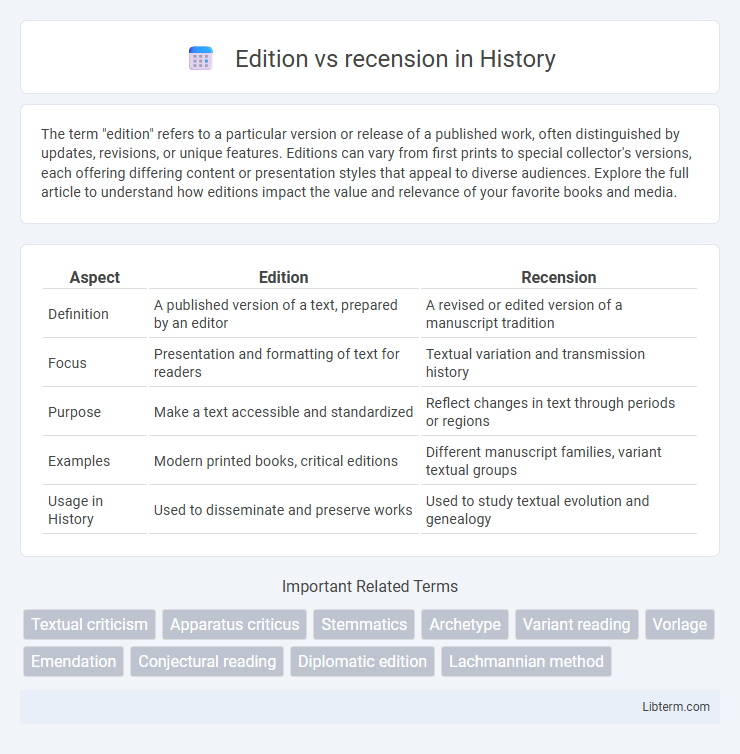The term "edition" refers to a particular version or release of a published work, often distinguished by updates, revisions, or unique features. Editions can vary from first prints to special collector's versions, each offering differing content or presentation styles that appeal to diverse audiences. Explore the full article to understand how editions impact the value and relevance of your favorite books and media.
Table of Comparison
| Aspect | Edition | Recension |
|---|---|---|
| Definition | A published version of a text, prepared by an editor | A revised or edited version of a manuscript tradition |
| Focus | Presentation and formatting of text for readers | Textual variation and transmission history |
| Purpose | Make a text accessible and standardized | Reflect changes in text through periods or regions |
| Examples | Modern printed books, critical editions | Different manuscript families, variant textual groups |
| Usage in History | Used to disseminate and preserve works | Used to study textual evolution and genealogy |
Definition of Edition and Recension
An edition refers to a specific version of a published text, typically representing a finalized form that incorporates revisions, corrections, and formatting decisions by the editor or publisher. A recension, in textual criticism, denotes a particular revision or redaction of a text derived from comparison and collation of various manuscripts, aiming to establish a historically authentic version. While an edition is intended for public dissemination, a recension focuses on the scholarly process of reconstructing the text's original or most authoritative state.
Historical Origins of the Terms
The term "edition" originates from the Latin word "editio," meaning the act of publishing or producing a text, historically referring to the authorized printing of a work. "Recension" derives from the Latin "recensio," implying a critical revision or review, traditionally used in manuscript scholarship to denote a critical examination and correction of textual variants. Both terms emerged during the Renaissance era, reflecting the evolving practices of textual criticism and the dissemination of literature in print culture.
Key Differences Between Edition and Recension
Edition refers to a specific version of a published text, often produced by an editor or publisher, while recension involves critical revision and comparison of multiple manuscripts to establish the most accurate text. Editions are aimed at readers and typically standardize content, formatting, and annotations, whereas recensions focus on textual scholarship, analyzing variations to reconstruct original or authoritative versions. Key differences include their purpose--publication versus textual criticism--and their scope, with editions being finalized products and recensions representing scholarly processes.
Contexts of Use: Publishing vs Textual Criticism
Edition primarily refers to the published version of a text, tailored for readers and commercial distribution in the context of publishing. Recension involves the critical comparison and revision of various manuscript versions to establish an authoritative text, a process fundamental to textual criticism. While editions target accessibility and reader engagement, recensions emphasize accuracy and historical authenticity in scholarly research.
Common Examples of Editions
Common examples of editions include first editions, revised editions, and critical editions, each representing different stages of a text's publication and interpretation. First editions often hold significant value for collectors, while revised editions incorporate updates or corrections made by the author or editor. Critical editions provide scholarly analysis and annotations, aiming to establish an authoritative version by comparing various manuscripts or earlier printed versions.
Notable Instances of Recensions
Notable instances of recensions include the three primary versions of the Hebrew Bible: the Masoretic Text, the Septuagint, and the Samaritan Pentateuch, each reflecting distinct textual traditions. The Homeric epics possess multiple recensions, with variations derived from different oral and manuscript sources, influencing interpretations of the Iliad and the Odyssey. In Buddhist scriptures, the Pali Canon and various Sanskrit recensions showcase the evolution of texts across regions and sects, highlighting significant doctrinal shifts.
Editorial Process in Creating an Edition
The editorial process in creating an edition involves critically examining various recensions--different manuscript versions--to establish a reliable text. Editors collate variant readings, assess textual discrepancies, and apply philological methods to reconstruct the most authentic version possible. This process ensures that the edition reflects a careful balance between historical accuracy and readability, distinguishing it from a recension, which refers to the manuscript tradition itself.
Methodology in Producing a Recension
Producing a recension involves a rigorous methodology emphasizing the comparative analysis of multiple manuscript variants to reconstruct an authoritative text version. Editors collate diverse textual witnesses, identifying scribal errors, interpolations, and omissions to establish a coherent and historically grounded narrative. This critical approach transcends simply printing editions by prioritizing textual integrity through systematic recension principles.
Importance in Literary and Academic Studies
Edition refers to a specific published version of a text, often standardized and edited for clarity or accuracy, while recension denotes the process of critically revising and comparing multiple manuscripts to reconstruct the original content. In literary and academic studies, understanding the distinction is crucial for evaluating textual integrity and historical authenticity, as editions may reflect editorial choices and recensions aim to recover the author's original intent through rigorous analysis. Scholars rely on recension to identify textual variants and establish authoritative versions, ensuring accurate interpretation and meaningful critical discourse.
Choosing Between Edition and Recension
Choosing between edition and recension depends on the purpose of textual analysis and the desired scope of variation. An edition typically presents a finalized, authoritative form of a text, incorporating corrections and emendations, while a recension involves a critical examination of multiple manuscript variants to reconstruct an original or earlier version. Scholars prioritize editions for publication and study, while recensions are essential for understanding textual transmission and historical development.
Edition Infographic

 libterm.com
libterm.com